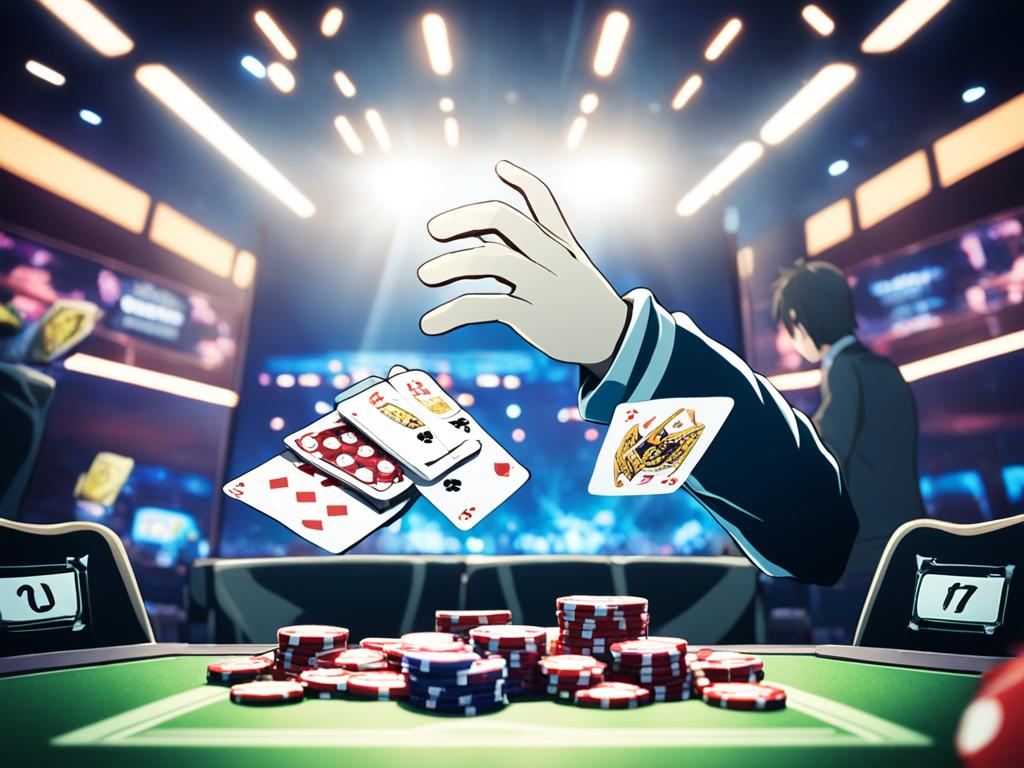Welcome to our in-depth exploration of the delicate balance between skill and luck in poker tournaments, brought to you by PHLWIN. As avid poker players, we understand the excitement and strategic thinking involved in these thrilling events.
Have you ever wondered how much of a player’s success in a poker tournament is determined by skill and how much by luck? In this article, we will dive into the insights provided by PHLWIN, shedding light on the factors that shape poker tournaments and examining the significance of skill and luck in determining outcomes.
Whether you’re a professional player or a casual enthusiast, understanding the dynamics between skill and luck can greatly enhance your chances of success. So let’s embark on this journey to unravel the mysteries behind the cards and uncover strategies to maximize your skill advantage.
Understanding the Factors that Shape Poker Tournaments
Before diving into the skill vs. luck debate, it is essential to grasp the various factors that influence the dynamics of poker tournaments. These factors play a crucial role in shaping the overall experience and outcomes of the game. Let’s delve into some of these key elements:
Blind Structure
The blind structure in a poker tournament determines the betting increments and the pace at which players are required to put their chips in the pot. It influences the level of risk and strategy employed by players, as well as the potential for aggressive or conservative gameplay.
Stack Sizes
The size of a player’s chip stack significantly impacts their decision-making process during a poker tournament. A larger stack provides more flexibility and opportunities to apply pressure on opponents, while a smaller stack may necessitate more cautious play to avoid elimination.
Table Dynamics
The interaction between players at the table can greatly influence the flow of a poker tournament. The dynamics include factors such as player personalities, playing styles, and the ability to read opponents. Understanding and adapting to these dynamics can give a player a significant advantage.
Tournament Formats
Tournaments come in various formats, including but not limited to freezeouts, rebuy/add-on, shootout, and satellite tournaments. Each format introduces unique rules and strategies, catering to different player preferences and objectives.
By considering these factors, players can better navigate the intricacies of poker tournaments, optimizing their gameplay and increasing their chances of success. Now, let’s explore the significance of skill in poker tournaments, starting with the next section.
The Significance of Skill in Poker Tournaments
Skill is of utmost significance in poker tournaments, serving as a determining factor for long-term success. Possessing a range of essential skills is vital for outplaying opponents and increasing the chances of winning. Let’s explore the key skills that players need to master in order to thrive in the competitive world of poker tournaments.
Hand Reading
Hand reading is a critical skill that separates good players from great players. It involves analyzing opponents’ actions, betting patterns, and their likely range of hands based on available information. By accurately deciphering opponents’ intentions and making informed decisions, skilled players gain a significant advantage at the poker table.
Probability Assessment
Understanding probabilities is essential in poker. Skilled players can accurately assess the likelihood of specific events occurring, such as hitting a flush or completing a straight. This skill enables players to make informed decisions based on the expected value of their actions, optimizing their chances of success in the long run.
Strategic Decision-making
Strategic decision-making encompasses a wide range of skills, including knowing when to fold, call, raise, or bluff. Skilled players carefully evaluate their options based on factors such as their position at the table, stack sizes, opponents’ tendencies, and the current stage of the tournament. Making well-calculated decisions strategically maximizes the potential for success.
“In poker, your skill is not only measured by the cards you play but also by the decisions you make.”
To illustrate the significance of skill in poker tournaments, let’s take a look at the following table:
| Player | Tournament Wins | Years of Experience |
|---|---|---|
| Daniel Negreanu | 6 | 20 |
| John Doe | 0 | 5 |
As the table shows, Daniel Negreanu, a highly skilled player with six tournament wins, outperforms John Doe, a less experienced player with no wins. This comparison highlights the significance of skill in achieving success in poker tournaments.
The Influence of Luck on Poker Tournament Outcomes
While skill undoubtedly plays a significant role in poker tournaments, luck cannot be disregarded. The unpredictable nature of luck can often have a profound impact on short-term results, adding an element of excitement and uncertainty to the game. In this section, we will explore the influence of luck on poker tournament outcomes, including the role of variance and the concept of running hot or running cold.
When it comes to poker, luck can be both a friend and a foe. In any given hand, luck can either favor a player by delivering them a favorable pocket hand or a well-timed card on the felt, or it can work against them, causing them to lose valuable chips. The influence of luck becomes particularly pronounced in high-pressure tournament situations, where a single card can make or break a player’s chances of advancement.
The concept of variance further underscores the impact of luck in poker tournaments. Variance refers to the natural fluctuations in a player’s results over a short period of time. This can be seen in the form of winning streaks or losing streaks, where luck seems to have a disproportionate influence on the overall outcomes. Skillful players understand that these fluctuations, caused by luck, are an inherent part of the game and must be managed accordingly.
Furthermore, the phenomenon known as “running hot” or “running cold” can significantly shape the outcomes of poker tournaments. When a player is running hot, they experience a series of favorable outcomes where luck seems to be consistently on their side. Conversely, when running cold, a player may encounter a string of unfortunate events that appear to defy the odds. Understanding and adapting to these fluctuations is crucial for players seeking to optimize their tournament performance.
“Poker is a lot like life. You make the best decisions you can based on the information available to you, but in the end, luck has a say in the outcome.”
Exploring the Impact of Luck: The Role of RNG
One factor that exacerbates the influence of luck in online poker tournaments is the use of a Random Number Generator (RNG). The RNG ensures that card distributions are completely random and unbiased, simulating the unpredictability of real-life shuffling. While this ensures fairness, it also means that luck can swing dramatically in favor of or against players with each new hand dealt.
The interplay of skill and luck in poker tournament outcomes creates an arena where players must effectively navigate and adapt to the volatile nature of the game. Strategies that strike a balance between utilizing skillful decision-making and embracing the uncertainty of luck can yield the best results. In the next section, we will delve into strategies that players can employ to maximize their skill advantage in poker tournaments.
| Luck Factors | Influence |
|---|---|
| Variance | Impacts short-term results and overall outcomes of players |
| Running hot or running cold | Can shape the course of a tournament for individual players |
| RNG | Adds an unavoidable element of luck to online poker tournaments |
Understanding the influence of luck on poker tournament outcomes is crucial for players looking to enhance their understanding of the game and improve their strategies. By recognizing the role of luck and its various manifestations, players can develop a more well-rounded approach to the game and make better-informed decisions.
Strategies to Maximize Skill Advantage in Poker Tournaments
When it comes to poker tournaments, skill can be your greatest asset. PHLWIN offers valuable insights into how players can harness their skills to gain a competitive advantage. By employing the right strategies, you can ensure maximize your chances of success in the high-stakes world of poker.
Stack Management
One of the key strategies to consider is effective stack management. Maintaining a healthy stack allows you to make calculated moves and put pressure on your opponents. By playing smart and knowing when to make strategic bets versus when to fold, you can keep your stack growing while staying in control of the game.
Position Play
Another crucial aspect of maximizing your skill advantage is using your position at the table to your benefit. It’s important to understand how your position affects your ability to make informed decisions. By playing aggressively when in a stronger position and being more cautious when out of position, you can gain an edge over your opponents and increase your chances of winning.
Exploiting Opponents’ Weaknesses
Every player has their weaknesses, and skilled players know how to exploit them. By observing the playing styles and tendencies of your opponents, you can identify their weaknesses and adjust your strategy accordingly. Whether it’s capitalizing on their overaggressive betting or their inclination to fold under pressure, recognizing and exploiting these weaknesses can give you a significant advantage in the tournament.
Reading Player Tendencies
The ability to read your opponents and understand their playing patterns is a skill that can greatly enhance your chances of success. By paying attention to their betting patterns, body language, and verbal cues, you can gain valuable insights into their holdings and intentions. This information allows you to make more informed decisions and adapt your strategies accordingly, giving you the upper hand in poker tournaments.
“To win at poker, you must exploit the weaknesses of your opponents while concealing your own.” – Doyle Brunson
By implementing these strategies, you can maximize your skill advantage and increase your chances of winning in poker tournaments. Remember, mastering these tactics takes practice and patience. As you refine your skills, you’ll find yourself making more informed decisions and consistently outplaying your opponents.
| Benefits of Maximizing Skill Advantage | Actions You Can Take |
|---|---|
| Increased profitability | 1. Study and analyze your opponents |
| More confidence at the table | 2. Practice reading player tendencies |
| Better decision-making | 3. Implement effective stack management |
| Ability to adapt to changing circumstances | 4. Take advantage of positional play |
| Higher win rate | 5. Continuously improve your skills through study and practice |
Incorporating these strategies into your game plan will give you an edge over your opponents and maximize your skill advantage. Remember, poker is a game of skill, and by honing your abilities and employing intelligent strategies, you can dominate the poker tournament scene.
Mitigating the Effects of Bad Luck in Poker Tournaments
Bad luck can strike even the most skilled players in poker tournaments. However, there are strategies that can help mitigate its effects and improve your overall chances of success. By implementing proper bankroll management, maintaining emotional control, and managing your expectations, you can navigate through the ups and downs of poker tournaments with resilience.
Bankroll Management
One effective way to mitigate the effects of bad luck is through prudent bankroll management. Set a budget for your poker tournament participation and stick to it. This will help protect your overall financial stability and prevent large losses due to unfortunate streaks of bad luck. Determine your comfort level with risk and ensure that your bankroll is appropriately allocated to different stake levels and tournament buy-ins.
Emotional Control
Emotions can run high in poker tournaments, especially when faced with bad luck. It is crucial to maintain emotional control and not let frustration or disappointment cloud your judgment. Avoid making impulsive decisions or taking unnecessary risks due to emotional reactions. Take a step back, breathe, and focus on making rational, calculated decisions based on your skills and the current game dynamics.
Managing Expectations
Managing your expectations is another key aspect of mitigating the effects of bad luck. Understand that poker tournaments involve both skill and luck, and there will always be factors beyond your control. Instead of getting fixated on short-term results, focus on long-term success and incremental improvements. Set realistic goals and celebrate small victories along the way, regardless of the immediate outcomes of individual tournaments.
“Bad beats are a part of the game, but how you handle them defines your growth as a player.”
By implementing these strategies, you can mitigate the negative effects of bad luck and remain focused on the bigger picture. Remember that consistency, perseverance, and continuous improvement are essential in the ever-changing landscape of poker tournaments.
The Importance of Adaptability in Poker Tournaments
Poker tournaments are dynamic environments that require players to possess a crucial skill: adaptability. Successful players understand the significance of adapting and making strategic adjustments based on ever-changing circumstances. In this section, we will explore the importance of adaptability and the flexibility of game plans in the context of poker tournaments.
The Significance of Adaptability
Adaptability is vital in poker tournaments due to the constantly evolving nature of the game. No two hands or opponents are the same, and being able to recognize and adjust to different situations is key to success. By adapting their strategies, players can capitalize on opportunities, overcome obstacles, and stay ahead of their opponents.
Flexibility of Game Plans
A player’s game plan must be adaptable and flexible to accommodate various scenarios during a poker tournament. Different stages of the tournament, changes in chip stacks, table dynamics, and player tendencies all require adjustments to maximize the chances of winning.
“In poker tournaments, adaptability allows players to navigate through challenges, exploit advantageous situations, and make strategic decisions that can ultimately lead to victory.” – Professional Poker Player
Successful players understand that rigidly sticking to a single approach can be detrimental. Instead, they remain open-minded, constantly analyzing the game, and adapting their strategies accordingly. This allows them to stay one step ahead and make informed decisions that consider both their cards and the actions of their opponents.
The Importance of Adapting to Table Dynamics
Table dynamics play a significant role in poker tournaments as the composition of players at each table can greatly impact the dynamics of the game. Adaptable players are adept at assessing the playing styles, tendencies, and behaviors of their opponents. By adjusting their own style and exploiting weaknesses, adaptable players can gain an edge over their competitors.
The Role of Observation and Analysis
Adaptability requires players to be observant and analytical. By closely studying their opponents, taking note of their betting patterns, hand selections, and reactions, players can gather valuable information that helps them adapt their strategies. This keen observation allows players to make informed decisions and adjust their game plans accordingly.
By incorporating adaptability into their gameplay, players can navigate the intricacies of poker tournaments, respond effectively to changing circumstances, and increase their chances of success. The ability to adapt and adjust strategies sets skilled players apart and is crucial in achieving consistent results in the ever-evolving world of poker tournaments.
The Role of Mindset in Poker Tournament Success
When it comes to poker tournaments, having the right mindset is essential for achieving success. It’s not just about the cards you are dealt; it’s about how you approach the game mentally. A strong mindset can impact your performance and overall results in the tournament.
Discipline is a vital component of a winning mindset. It involves sticking to your game plan, making wise decisions, and avoiding impulsive moves. In the heat of the game, it’s easy to get carried away or chase losses, but discipline enables you to stay focused and make calculated plays.
Focus is another critical element in tournament success. It means paying close attention to the game, the actions of other players, and the changing dynamics at the table. By maintaining focus, you can pick up valuable information and make informed decisions that give you an edge over your opponents.
Patience is a virtue that every successful poker player possesses. Tournaments can have long stretches of slow play and minimal action, but it’s crucial to remain patient and wait for the right opportunities. Making rushed or impatient moves can lead to costly mistakes and early exits from the tournament.
Finally, maintaining a positive attitude throughout the ups and downs of a tournament is essential. It’s easy to become frustrated or discouraged after a bad beat or a string of losses, but a positive mindset allows you to bounce back and stay in the game with a clear focus on your strategy.
“Having a strong mindset is like having an extra card up your sleeve. It can be the difference between folding under pressure and rising above it to secure victory.”
To illustrate the impact of mindset, let’s take a look at a table showcasing the difference in performance between two players with contrasting mindsets:
| Player | Discipline | Focus | Patience | Attitude |
| ————- | :——–: | :—: | :——: | :——: |
| Player A | Yes | Yes | Yes | Positive |
| Player B | No | No | No | Negative |
In the above table, Player A demonstrates all the key mindset qualities mentioned, while Player B lacks these essential attributes. It is evident that Player A, with a disciplined, focused, patient, and positive mindset, is more likely to achieve success in the tournament compared to Player B.
A strong mindset sets the foundation for making better decisions, managing emotions, and adapting to different game situations. By cultivating discipline, focus, patience, and a positive attitude, you can enhance your performance and increase your chances of poker tournament success.
Conclusion
In conclusion, the debate between skill and luck in poker tournaments is a complex one that intertwines both factors. While luck can certainly play a role in determining short-term outcomes, skill remains the primary factor for long-term success in the world of poker.
Players who seek to maximize their chances of winning should focus on understanding the dynamics of the game and employing strategic approaches. By honing their skills in hand reading, probability assessment, and strategic decision-making, players can tilt the odds in their favor and outplay their opponents.
PHLWIN’s valuable insights serve as a guiding light for players navigating this delicate balance between skill and luck. With their guidance, players can develop adaptive strategies, minimize the impact of bad luck, and maintain the right mindset to overcome the challenges of a poker tournament.
By embracing the importance of skill while acknowledging the role of luck, players can position themselves for long-term success in the thrilling world of poker tournaments.






